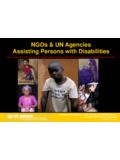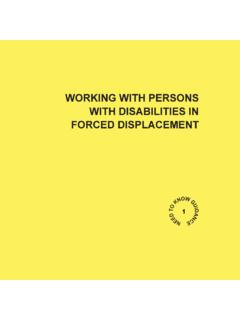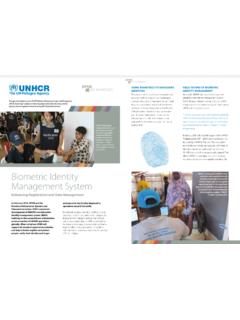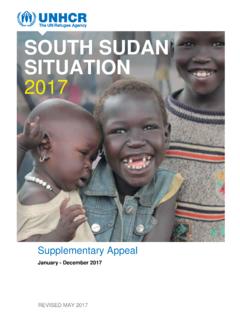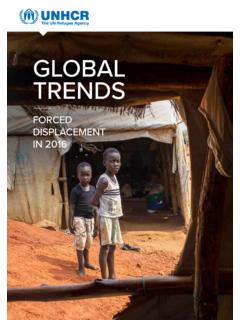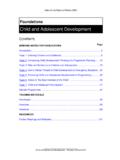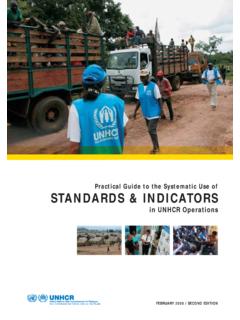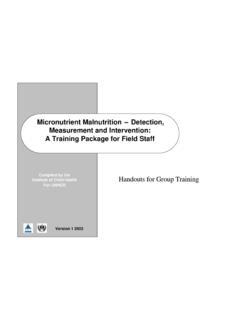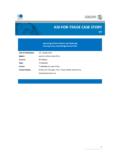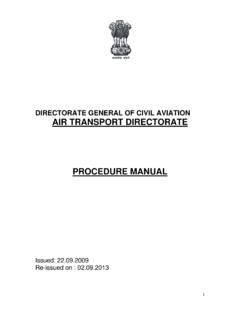Transcription of RECRUITMENT PROFILE Post Title: Major Duties and ...
1 RECRUITMENT PROFILE Post Title: Logistics Officer Post Level: P-3 Major Duties and Responsibilities 1. Assesses and organizes logistics in terms of transport requirements, receipt, handling, storage and distribution of relief items and establishes proper warehousing and recording systems including assets; 2. Establishes a detailed procurement programme plan to determine appropriate specifications of required items, according to established guidelines and procedures and in coordination with Supply Management Service (SMS) at Headquarters; 3. In cooperation with SMS, prepare for receipt of international shipments, and liaises with competent authorities for tax exemptions, port clearances, etc. and the timely delivery of relief items to the beneficiaries; 4. Liaises and keeps close contacts with UNHCR implementing partners involved in programme implementation and assists them in all matters pertaining to logistics and procurement; 5.
2 Carries out regular trips to ensure that relief material forwarded to projects has been received and properly accounted for at their destinations, and in case of loss or damage follow up with clearing agents, shipping and insurance companies in liaison with SMS; 6. Devises methods of stock control, closely monitors warehousing management, and regularly submits situation reports on stocks, equipment and prepositioned goods; 7. Normally supervises and coordinates the work of at least one lower level professional and 2 or more locally recruited staff; 8. Undertakes other Duties as required. Normal Purpose of Typical Job Contacts WITH UNHCR STAFF: To persuade and obtain assistance of others on matters of non-routine significance. WITH EXTERNAL PARTIES: To act as adviser or representative of the Organisation with authority to discuss problems and seek common ground on which to recommend solutions based on predetermined guidelines provided by higher authority.
3 Contacts are predominantly with persons on subject matters of importance to Organisation s programmes ( counterparts in other organisations or at working level in national Governments). Managerial Competencies (if any) (see attached Annex) MC03 Managing Performance MC04 Coaching and Developing Staff MC05 Managing Resources MC06 Political and Organization Awareness Functional Competencies (see attached Annex) PL01 Assessing the Situation PL02 Planning and Designing Logistics PL03 Managing Procurement Planning and Strategy PL07 Logistics Implementation PL09 Providing Logistics Information PL10 Transport, Storage and Distribution Academic Qualifications First University degree (BA/BSc.) in Economics, Engineering, Management, Transport and Logistics Advanced University degree (MSc.)
4 In Transportation/Logistics without a first degree Other relevant qualifications in addition to the above Advanced logistics/transport training at military academy/college/school Training in specialised institutions (BIOFORCE, etc.), commercial, polytechnic colleges Additional advanced degree (MSc/MA/MBA) in transport, logistics, management with a first degree Membership in relevant chartered institute Relevant Experience Minimum 5 years experience in a combination of transport/shipping/insurance/freight/for warding/procurement One or more years UN-based experience and/or work in multi-cultural, multi-national context Work in developing countries (other than own) under conditions of poor infrastructure and difficult working and living conditions. Work experience in the humanitarian field Language skills Excellent knowledge of English and French (or another UN official language) Knowledge of other languages an asset.
5 Managerial and Technical Skills Managerial responsibilities Supervisory responsibility Ability to undertake large procurement of commodities and services Ability to prepare and administer budgets/resources/people Communication/inter-personal skills/team work Emergency management skills Negotiating skills Ability to work with computers Demonstrated writing/drafting skills Fleet management skills Ability to train and educate other people Knowledge of UN Financial Rules and Regulations an advantage Relevant vocational training ( pilots license, PSV license, master mariner s certificate, vehicle maintenance, first aid, telecommunications) ANNEX MC03 MANAGING PERFORMANCE COMPETENCY Demonstrates the ability to agree objectives and competencies with staff which will support achievement of the office's plans, and to provide them with feedback on their performance.
6 WHY IT MATTERS In order to achieve results, managers need to set the direction, focus staff members on specific objectives, and monitor and support their performance. A performance appraisal process, properly applied, can be a vital tool in managing and improving the performance of staff to achieve the operation's objectives and meet required standards of performance. INDICATORS I Guides staff in understanding operational priorities for the period in question, and agrees objectives with them which reflect these priorities. II Guides staff in understanding the competencies required in the job as a whole. III Gives regular, constructive feedback on performance which is aimed at helping the staff member to capitalise on strengths and improve performance in areas of need, and carries out a timely mid-term progress review.
7 IV Appraises the performance of staff honestly, fairly and consistently, respecting UNHCR guidance on applying the appraisal process ( timing, application of rating scale etc). V Gives staff with performance difficulties every reasonable opportunity and assistance to improve, but always addresses the problem directly, using the appropriate procedures. VI Takes responsibility as Reviewing Officer for ensuring that the appraisal process is correctly carried out by supervisors, and appraising their performance fairly as a result. MC04 COACHING AND DEVELOPING STAFF COMPETENCY Demonstrates the ability to provide effective coaching and encourage appropriate development activities in order to support staff in identifying and meeting their training and development needs. WHY IT MATTERS Staff development plays an important role in ensuring that staff are able to achieve their objectives, meet required standards of performance in their current job, and acquire skills needed for future career plans where appropriate.
8 But staff development is not limited to formal, off-the-job training courses. Managers have a crucial role to play, by helping staff understand their training and development needs, and providing them with opportunities to meet them. In support of this, managers need to recognise the importance of good coaching skills. INDICATORS I Supports staff in identifying their training and development needs in relation to competencies required to do the job. II Provides effective feedback and coaching to staff managed, with the aim of guiding them to improve their performance or acquire new competencies. III Seeks to maximise the use of on-the-job opportunities for developing staff, and in lieu of formal training, supports cost effective methods of development. IV Encourages learning activities which foster team building and effective teamwork.
9 V Counsels staff in reviewing their future career options and identifying realistic career goals; facilitates achievement of development activities in support of goals where feasible and appropriate. MC05 MANAGING RESOURCES COMPETENCY Demonstrates the ability to plan and use resources (people and/or finance and/or physical assets) in accordance with UNHCR/UN guidelines and delegated accountability so that objectives are achieved in the most effective manner possible. WHY IT MATTERS Resources are limited and must be used to the best effect for the benefit of refugees, to maintain the essential staff confidence in management, and government confidence in UNHCR. INDICATORS I Uses the agreed strategic direction for the area of responsibility to identify, prioritise and plan resource requirements as accurately and as early as possible.
10 II Identifies the resources currently in place which would support achievement of the strategic direction and puts plans in place to gain additional resources if required. III Establishes 'indicators' to monitor the progress and effectiveness of plans and use of resources. IV Monitors the use of resources to ensure they are in line with UNHCR/UN rules and guidelines, and adjusts resource plans as required in response to changing circumstances. V Reviews and evaluates achievements to enhance future planning and resource utilisation. MC06 POLITICAL AND ORGANISATIONAL AWARENESS COMPETENCY Identifies and understands relationships, constraints and pressures affecting others, and especially refugees. WHY IT MATTERS This competency underlines the importance for managers to be able to understand the motivations and objectives of others.

